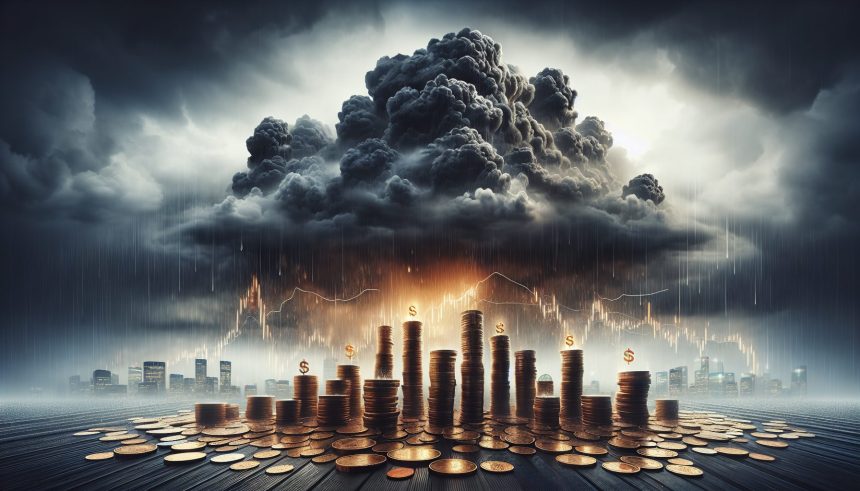Jim Cramer, a well-known television personality and financial commentator, has predicted that the stock market may experience a crash similar to the infamous ‘Black Monday’ of 1987 due to the tariffs imposed by former President Donald Trump. This prediction was made during a live television broadcast and has since gone viral, stirring a mix of concern and debate among investors and financial analysts. Cramer’s forecast draws a stark comparison to the market debacle of October 19, 1987, when stock markets around the world crashed, with the Dow Jones Industrial Average falling by 22.6% in a single day.
According to Cramer, the impact of the tariffs could mirror the conditions that led to the dramatic sell-off seen during Black Monday. While the likelihood and timing of such a crash are subject to debate, Cramer’s statement has certainly put a spotlight on the delicate balance of the current economic policies and their potential ramifications on the global financial market. Jim Cramer is known for his sometimes controversial, but always headline-grabbing predictions.
His latest claim continues to fuel discussions on the long-term effects of trade policies and the need for strategies to mitigate potential economic downturns. CNBC’s Jim Cramer expressed regret over his earlier support for former President Donald Trump’s tariff policies. In an interview, Cramer described his previous belief in the tariffs as misguided and criticized their implementation as “bush league.”
“I feel like a sucker,” Cramer admitted, indicating his deep disappointment with the outcomes of the tariffs, which were initially intended to bolster the U.S. economy by penalizing overseas producers.
The tariffs were a cornerstone of Trump’s trade strategy, aimed at reducing the trade deficit and bringing manufacturing jobs back to the United States. However, critics argue that the tariffs have instead led to higher costs for American consumers and strained relationships with key allies. Cramer’s comments underscore a broader reevaluation among some analysts and commentators of the long-term effects of the Trump administration’s economic policies.
While supporters continue to defend the tariffs as a necessary measure for protecting American industries, detractors point to the resulting trade wars and increased prices as evidence of the policy’s flaws. Jim Cramer said Thursday that long-term investors must steel themselves as the stock market tanks following President Donald Trump’s sweeping tariff announcement.
Cramer’s market crash warning draws comparison
During “Squawk on the Street,” Cramer emphasized the importance of patience among investors who do not need immediate access to their funds. Reflecting on past market downturns, Cramer drew parallels to the 2007-2008 financial crisis, noting, “If you were OK in 2007 and 2008, it came back. It did take until 2013 to get the money back,” he said.
He acknowledged that investors nearing retirement are in a difficult position but urged against panic-selling. “Don’t sell, just hold,” he concluded. Cramer revealed that he has actually taken the market dip as an opportunity to buy more shares for the Investing Club portfolio, targeting stocks that he believes are unfairly punished in the current climate.
He views the market plunge as a price-to-earnings (P/E) ratio recalibration event. “The current forward multiple on earnings for the next 12 months is just above 20, while the trailing P/E, which looks at the past four quarters, was closer to 25,” Cramer explained. P/E ratios are crucial metrics on Wall Street for determining stock valuation and investor willingness to pay.
Reflecting further, Cramer recounted his advice during the financial crisis. “In 2007, I went on the ‘Today’ show and said, ‘If you need any money in the next five years, you should sell.’ And it was a great call,” he said. He also recalled Mark Haines’ famous call of the financial crisis market bottom on March 10, 2009, a moment now known as the “Haines bottom.”
Cramer explained the challenge of market timing, noting, “The problem with my advice back then is people only remember the sell call and not when to get back in.
Investors who try market timing need to be right twice: first on the sale and second on the repurchase at the bottom.”
On Thursday, Cramer said he is using the market sell-off as an opportunity to capitalize on widespread fears and invest in stocks that could withstand the impact of Trump’s tariffs. His approach aims to identify and buy resilient stocks amid the uncertainty caused by the tariffs.







